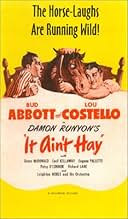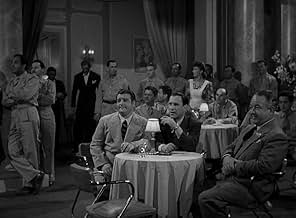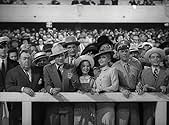IMDb RATING
6.5/10
1.1K
YOUR RATING
The horse of a street vendor is replaced by a racehorse.The horse of a street vendor is replaced by a racehorse.The horse of a street vendor is replaced by a racehorse.
- Director
- Writers
- Stars
- Awards
- 1 nomination total
The Four Step Brothers
- The Step-Brothers
- (as The Four Step-Brothers)
Charles Bennett
- SPCA Driver
- (uncredited)
- Director
- Writers
- All cast & crew
- Production, box office & more at IMDbPro
Featured reviews
IT AIN'T HAY (Universal, 1943), directed by Erle C. Kenton, stars the popular comedy team of Bud Abbott and Lou Costello in a horse racing story based on "Princess O'Hara" by Damon Runyon. Previously filmed as PRINCESS O'HARA by Universal (1935) starring Jean Parker and Chester Morris, this 1943 edition is a very loose adaptation to the Runyon tale, being more emphasis on Abbott and Costello than the title character of Princess O'Hara, here played by an appealing youngster by the name of Patsy O'Connor.
The plot development introduces Princess Peggy O'Hara (Patsy O'Connor) as a carriage driver of New York City giving a ride to Private Joe Collins (Leonard Noble) and his girl, Kitty McGloin (Grace MacDonald) as they go through Central Park. Peggy and her father, King O'Hara (Cecil Kellaway) are best friends with Wilbur Hoolihan (Lou Costello), a taxi driver, and his shiftless partner, Grover Mockridge (Bud Abbott). After Wilbur gives their horse, Finnigan, some of his peppermint candy, the horse becomes sick, with Wilbur being the only one who can cure him with a giant horse pill. Sadly, the horse dies, leaving Grover and Wilbur to make amends by earning enough money to buy the Princess a new horse. With one thing leading to another, such as unwittingly buying a police horse, three gamblers, Umbrella Sam (Shemp Howard), a "Damon Runyon" character, Harry the Horse (Eddie Quillan) and Chauncey the Eye (David Hacker), the dual go to the upstate stables of Empire Track to acquire a free horse. Instead, Grover and Wilbur end up getting Tea Buscuit, the world's famous racehorse belonging to Colonel Brainard (Samuel S. Hinds), who offers $10,000 reward for its return. Realizing what they have done, and learning that King O'Hara has taken both horse and carriage to Saratoga with the stolen horse, Wilbur, along with Kitty, Joe and Wilbur, drive his taxi to Saratoga, followed by the three gamblers out for the reward, and encounter a tough efficiency expert, Gregory Warner (Eugene Palette), now hotel manager, whom they have encountered earlier on several occasions, to add to their troubles.
As in many Abbott and Costello comedies up to this point, production numbers are added for entertainment value, including those scored by Harry Revel and Paul Francis Webster: "The Sunday Serenade" and "Old Timer" (both sung by Patsy O'Connor); "Glory Be" (introduced by Grace MacDonald, sung by others, including The Vagabonds, followed by specialty skating acts by The Hollywood Blondes and tap dancing routines by The Step Brothers); "Let's Smile With Music" and "Hang Your Troubles on a Rainbow" (both sung by Leonard Noble). While Noble's character, Joe, talks about doing an Army show throughout the story, it's obvious what was intended for a grand finale became nothing more than a brief montage of deleted song numbers with more attention focused on Abbott and Costello with Eugene Palette.
An exceptional comedy with assortment of old and new Abbott and Costello gags and chase sequences, for being a horse racing story, it would be natural for them to include their famous "fodder and mutter" routine into the story. With Abbott and Costello being the sole attractions, Eugene Palette, the heavy man with the froggy voice, comes close in stealing every scene he's in. In fact, he's practically a running gag throughout the story, being everywhere involving the boys, including the cafeteria (look fast for Mike Mazurki as one of the burly bouncers), Colonel Brainard's stable, the Oaks Hotel in Saratoga, the race track and finally their confrontation at the musical show. Palette is certainly one person in this story who makes IT AIN'T HAY a viewing pleasure. The Sportsman's Club involving Big-Hearted Charlie (Andrew Toombes) and the double-dealing Slicker (Richard Lane) also ranks one of the funnier scenes in the story. There are a couple of sequences that come as a reminder of scenes lifted from earlier Marx Brothers comedies of both DUCK SOUP (Paramount, 1933) and A DAY AT THE RACES (MGM, 1937). Watch for it.
While Costello shows how he can excel in sentiment moments involving the death of the horse without making it hard to sit through, the only downside comes when a kid calls Wilbur a murderer. His acting is so bad and hard to sit through (though fortunately brief), it's a wonder how it passed through in the final print, unless this kid happened to be related to someone in the production staff. Getting past this uneasy moment, the rest of this 80 minute feature is smooth racing right down to the finish line.
Although IT AIN'T HAY enjoyed frequent television revivals throughout much of the 1970s and 80s, it was reportedly taken out of circulation due to legal complications involving the Damon Runyon estate, keeping the movie from ever being issued on video cassette or DVD. By 2008, the rights were resolved and IT AIN'T HAY has become available on DVD in all its glory. For Abbott and Costello, or even Eugene Palette fans, IT AIN'T HAY is well worth the gamble. (***)
The plot development introduces Princess Peggy O'Hara (Patsy O'Connor) as a carriage driver of New York City giving a ride to Private Joe Collins (Leonard Noble) and his girl, Kitty McGloin (Grace MacDonald) as they go through Central Park. Peggy and her father, King O'Hara (Cecil Kellaway) are best friends with Wilbur Hoolihan (Lou Costello), a taxi driver, and his shiftless partner, Grover Mockridge (Bud Abbott). After Wilbur gives their horse, Finnigan, some of his peppermint candy, the horse becomes sick, with Wilbur being the only one who can cure him with a giant horse pill. Sadly, the horse dies, leaving Grover and Wilbur to make amends by earning enough money to buy the Princess a new horse. With one thing leading to another, such as unwittingly buying a police horse, three gamblers, Umbrella Sam (Shemp Howard), a "Damon Runyon" character, Harry the Horse (Eddie Quillan) and Chauncey the Eye (David Hacker), the dual go to the upstate stables of Empire Track to acquire a free horse. Instead, Grover and Wilbur end up getting Tea Buscuit, the world's famous racehorse belonging to Colonel Brainard (Samuel S. Hinds), who offers $10,000 reward for its return. Realizing what they have done, and learning that King O'Hara has taken both horse and carriage to Saratoga with the stolen horse, Wilbur, along with Kitty, Joe and Wilbur, drive his taxi to Saratoga, followed by the three gamblers out for the reward, and encounter a tough efficiency expert, Gregory Warner (Eugene Palette), now hotel manager, whom they have encountered earlier on several occasions, to add to their troubles.
As in many Abbott and Costello comedies up to this point, production numbers are added for entertainment value, including those scored by Harry Revel and Paul Francis Webster: "The Sunday Serenade" and "Old Timer" (both sung by Patsy O'Connor); "Glory Be" (introduced by Grace MacDonald, sung by others, including The Vagabonds, followed by specialty skating acts by The Hollywood Blondes and tap dancing routines by The Step Brothers); "Let's Smile With Music" and "Hang Your Troubles on a Rainbow" (both sung by Leonard Noble). While Noble's character, Joe, talks about doing an Army show throughout the story, it's obvious what was intended for a grand finale became nothing more than a brief montage of deleted song numbers with more attention focused on Abbott and Costello with Eugene Palette.
An exceptional comedy with assortment of old and new Abbott and Costello gags and chase sequences, for being a horse racing story, it would be natural for them to include their famous "fodder and mutter" routine into the story. With Abbott and Costello being the sole attractions, Eugene Palette, the heavy man with the froggy voice, comes close in stealing every scene he's in. In fact, he's practically a running gag throughout the story, being everywhere involving the boys, including the cafeteria (look fast for Mike Mazurki as one of the burly bouncers), Colonel Brainard's stable, the Oaks Hotel in Saratoga, the race track and finally their confrontation at the musical show. Palette is certainly one person in this story who makes IT AIN'T HAY a viewing pleasure. The Sportsman's Club involving Big-Hearted Charlie (Andrew Toombes) and the double-dealing Slicker (Richard Lane) also ranks one of the funnier scenes in the story. There are a couple of sequences that come as a reminder of scenes lifted from earlier Marx Brothers comedies of both DUCK SOUP (Paramount, 1933) and A DAY AT THE RACES (MGM, 1937). Watch for it.
While Costello shows how he can excel in sentiment moments involving the death of the horse without making it hard to sit through, the only downside comes when a kid calls Wilbur a murderer. His acting is so bad and hard to sit through (though fortunately brief), it's a wonder how it passed through in the final print, unless this kid happened to be related to someone in the production staff. Getting past this uneasy moment, the rest of this 80 minute feature is smooth racing right down to the finish line.
Although IT AIN'T HAY enjoyed frequent television revivals throughout much of the 1970s and 80s, it was reportedly taken out of circulation due to legal complications involving the Damon Runyon estate, keeping the movie from ever being issued on video cassette or DVD. By 2008, the rights were resolved and IT AIN'T HAY has become available on DVD in all its glory. For Abbott and Costello, or even Eugene Palette fans, IT AIN'T HAY is well worth the gamble. (***)
This film has not been restored and the Bud and Lou routines are great with perfect timing. One of their best routines are when they are by the race horse which is pulling the open carriage and Lou is briefed on the horse being a mudder and that the horse eats his fodder. The Step Brothers dancing scene is top rate and I haven't seen anything like it anywhere else. The Damon Runyon dialogue is great but because of the studios and family licensing differences, this film will pass into oblivion. What a shame this will be lost when so many would really enjoy it. The copies that are available are of such poor quality you really can't enjoy them.
It Ain't Hay (1943)
** 1/2 (out of 4)
I can finally say I've seen every Abbott and Costello film. It took me a while but I finally track down a copy of this one, which hasn't ever been released on home video due to some sort of rights issue. In the film, Costello accidentally kills a little girl's horse so he sets out to get her a new one. After waiting so long to finally see this one it really didn't turn out to be anything overly special. There are still some good gags but nothing too classic, although an inside joke about Universal was pretty nice. The "horse eats its father" joke was a highlight as was another scene where the boys try to pull a fast one and sneak off without paying for their lunch. Shemp Howard co-stars but it's Eugene Palette who really steals the film.
** 1/2 (out of 4)
I can finally say I've seen every Abbott and Costello film. It took me a while but I finally track down a copy of this one, which hasn't ever been released on home video due to some sort of rights issue. In the film, Costello accidentally kills a little girl's horse so he sets out to get her a new one. After waiting so long to finally see this one it really didn't turn out to be anything overly special. There are still some good gags but nothing too classic, although an inside joke about Universal was pretty nice. The "horse eats its father" joke was a highlight as was another scene where the boys try to pull a fast one and sneak off without paying for their lunch. Shemp Howard co-stars but it's Eugene Palette who really steals the film.
I spent years and years searching for IT AIN'T HAY, as it was the only A&C film missing from my collection. I finally got it this past Christmas. It isn't one of their better films, but it's still Abbott and Costello, and very enjoyable. There are several songs toward the beginning of the film, but by the second half they tone down quite a bit, which helps the film big time. This film also features among the best versions of the "Mudder; Fodder" routine. Costello is particularly funny in this one, and also has a couple of moments where he shows what a great dramatic actor he could be. Like I said, it isn't BUCK PRIVATES or MEET FRANKENSTEIN, but it's still good old Bud and Lou doing what they do best, and that's good enough for any true fan.
Abbott and Costello are at their very best in this agreeable comedy. They play a couple of Manhattan taxi drivers with a fondness for a sweet young girl and her horse. Costello means well in trying to be nice to the animal, but his feeding it candy ultimately causes the horse to get sick - and die. So he and Abbott set out to make things right by getting a new horse for the girl, whose dad (Cecil Kellaway) runs a horse and carriage ride in the city. I know that synopsis sounds rather dramatic, but there is a lot of well-staged comedy between the serious moments. And Bud and Lou are as sharp in ever performing them. Some routines include: their classic "the horse eats his fodder", the boys getting swindled at a phony horse race outfit, Lou getting into trouble at a restaurant for not being able to pay his check, and other assorted gags. Third Stooge Shemp Howard also has a part, but the real fun comes courtesy of fat man Eugene Palette, who is the perfect foil for Costello's antics. As with almost all of A&C's movie of this period, there is some singing and dance numbers here; however, I find them to be rather entertaining and endurable this time out. *** out of ****
Did you know
- TriviaConsidered by Bud Abbott and Lou Costello fans to be their "lost" film, it was never actually lost but was unavailable for viewing for many years due to legal issues with the Damon Runyon estate. The film was televised decades ago (presumably before the legal issues arose) but was never released on video, and was not included in MCA/Universal's original DVD sets of Abbott and Costello films that came out in 2004. In 2008 the rights issues were cleared and it was included in the DVD release "Abbott and Costello: The Complete Universal Pictures Collection."
- GoofsWhen Grover places his $100 bet, he places it on Seabiscuit's entered number. However, the horse with that number didn't win, so the ticket is worthless. Never mind that Seabiscuit won the race; bets at the track are on numbers, not on names.
- Quotes
Grover Mockridge: Go answer the door. It might be Warner.
Wilbur Hoolihan: It won't do no good. We're all signed up with Universal.
- ConnectionsReferenced in Guys and Dolls (1955)
- How long is It Ain't Hay?Powered by Alexa
Details
- Runtime1 hour 20 minutes
- Color
- Aspect ratio
- 1.37 : 1
Contribute to this page
Suggest an edit or add missing content





































